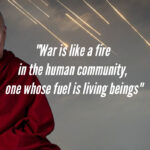
by Sulak Sivaraksa
?
Religion may in fact help anchor capitalism and trap us in its violent deadlock ad infinitum. Or to be even more blunt, to be truly against capitalism one must be against certain religious practices and thoughts.
Capitalism is often seen as the source of alienation. Alienation is marked by being uprooted from traditional community and certainty. Capitalism makes social relations thin and antagonistic and estranges us from ourselves as we frantically lose control of our lives. After all, we are living in “risk societies.” By providing hope and stressing relationality, religion or spirituality is said to help overcome isolation and alienation produced by capitalism in the contemporary world; and there is no point in the world that is external to capitalism these days. This implies that religion is anticapitalist at its core. There is of course some truth to this picture, but things are far from being this simple. As it turns out, capitalism seems to embed us in social relations while religion isolates us; and far from being anticapitalist, religion may in fact work in the service of capital. A rethinking and problematization of religion is thus necessary for overcoming capitalism and alienation.
First of all, as counterintuitive as it may initially sound, capitalism itself is increasingly promoting mechanisms and processes to overcome or at least cover up isolation and alienation, thereby rivaling or displacing religion. Who needs religion when capitalism can appear intimate, reflexive, and comforting – when capitalism befriends us? Thus, capitalism may not appear as a straightforward source of alienation.
Let’s look at consumerism as an example. Traditionally, consumerism is equated with alienation and isolation. I become slave to the things I own, acting as if they are not man-made (commodity fetishism). I ground my existence in my possessions, not relationality: “I shop, therefore I am.” In so doing, I am also alienated from nature. The things I possess are used to secure or affirm my social status in society; that is, conspicuous consumption. Or aggressive competition with my neighbors can take the form of consumption. I buy in order to show my neighbors/competitors that I’m better off than they are. I’ve got to have the things that my neighbors want first to put them in their place. I have fun in denying them their desires. Since desire is infinitely reproduced, this becomes a vicious cycle. There are no partners, only competitors – and hence no public. These types of conduct all contribute to alienation. And so we see movements that seek alternatives to consumerism, religious as well as secular.
Now, however, consumption does not always lead to alienation. A dominant trend in the new capitalism promises self-realization and public-mindedness through consumption. How many products actually promise self-fulfillment or improvement? Don’t we feel better and more responsible when our cereals come from organic farming, which, among other things, leads to less soil erosion? Don’t we feel (or imagine ourselves to be) superior and cosmopolitan when proceedings from the sales of the products we bought go to the construction of water reservoirs in debt-ridden Third World countries, the fighting of AIDS in the “Dark Continent,” the protection of rare wildlife in exotic Southeast Asia, the nourishing of starving orphans worldwide, and so on? How many of us also rely on purchased commodities to manifest ecological concerns in our stead – our ecofriendly sacks, canisters, cars, homes, and so on? Don’t we salute millionaires who donate a sizable chunk of their profits to charitable causes or to address humanitarian concerns – or to support religious organizations? There are numerous other examples. My point is that capitalism does not necessarily alienate. It allows you to engage and interact with others, at least at the level of empathy. It seems to have a more human and friendly face, so to speak. It is no longer cold and indifferent, making it all the more difficult to see its violence and class antagonism and to dismantle its oppressive structures. Alienation tells us what is wrong with the capitalist system. It should, however, be seen as a form of violence built into the capitalist system. Perhaps worse than alienation are exploitation, oppression, class warfare, and so on, constituting the structural violence of the capitalist system.
Furthermore, should we see capitalism as alienating or rather privatizing? Culturally, capitalism intensely cherishes the private and the personal. So many products enable you to personalize them, to make them a part of you or reflect who you “really” are. Aren’t we obsessed with our bodies? The private is quite literally everywhere. The car becomes your second home, for instance. Private experiences are broadcast live or sold in the forms of memoirs, diaries, video clips, and so on. Doesn’t the Net allow us to share pictures and videos of our cute pets or loved ones, bringing satisfaction and connection? Turning inward to the private self, to personal relations, or to authenticity may not really help serve as a bulwark against capitalism. Under capitalism, social relations may be thin, but private relations may be thick. Capital “homogenizes” us privately as opposed to socially.
Second, the symbols and values of contemporary capitalism are not necessarily alienating and isolating. In fact, they may be drawn from democracy itself. And we all have faith in democracy as the most we can hope for today, don’t we? Democracy values connection and communication, and so do major telecommunications corporations, financial speculators, portfolio investors, and so on. Democracy talks about diversity and multiculturalism, and so do global corporations and the transnational capitalist class. Nongovernmental organizations and transnational corporations both engage in awareness campaigns. Democracy talks about contingency and so do insurance companies. Democracy favors visibility but so do some Web sites, such as Facebook. And so on. This of course raises major doubts about democracy’s allegedly special capability to cope with or tame capitalism. In this context, what should religion’s position be vis-?-vis democracy? Is democracy as it exists today actually helping to make capitalism more secure?
Corporations these days also garb themselves in democratic and social values. They take corporate social responsibility seriously. They stress the importance of making transparent deals, of avoiding bribery and corruption, and so on. They are responsible to their stakeholders and not simply to their shareholders. They manifest deep concerns for the environment: “There is no business to be done on a dead planet” (David Brower). They are innovative, creative, and public-minded. They value social relations. The days of the mean moneymaking machines are over. Corporations these days normally and generously donate money outside the market, breaking the vicious cyc
le of using money to make more money. In sum, they are both profit-oriented as well as social-oriented; both are not seen as conflicting goals – a case of having one’s cake and eating it too: “I am a pro-growth, free market guy. I love the market. I think it is the best invention to allocate resources and produce enormous prosperity for
Third, and this will be the focus of this essay, religious values and practices themselves may be subsumable under or employed by capitalism. Put differently, religion may in fact help anchor capitalism and trap us in its violent deadlock ad infinitum. Or to be even more blunt, to be truly against capitalism one must be against certain religious practices and thoughts. We should not forget to problematize religion; it may in fact be part of the problem. It is not capitalism per se that we should counter but also religious solutions to the problems of capitalism. Let’s put some flesh on this thesis. I will focus on Buddhism in the context of my country,
The urban upper classes in
They are conscious of the sufferings in the world. At the subjective level, they are probably decent and compassionate people concerned about society, the environment and the world. They condemn violence. To shield themselves from harsh objective realities (whose conditions they in part help create), many of them live in a world of gated communities and private clubs. To feel good about themselves, they may engage in the various nonprofit activities mentioned above. To have further peace of mind and overcome alienation, they turn to Buddhism, in particular its meditation practices.
Many of them may find the time to practice meditation regularly. If the meditation masters in the country cannot help appease their restlessness, they can still rely on the deep meditation of
Thus most Thai Buddhists forget that social structures are not natural. Rather they are constructed alongside political and economic developments that are based on exploitation. As such they can be changed. There’s nothing true about them. Moral training should therefore be adapted to facilitate the transformation of society, not the preservation of things as they are.
If Buddhists do not perceive structural violence in both their knowledge and action, the mindfulness or inner peace that they are cultivating is merely a form of escapism. Many Buddhists often ask, Who are we to change the world? This mode of thinking is simply delusional. It shows a failure to grasp the Three Characteristics. That is, we must confront the state of suffering (dukkhata) and realize that things are transient (anniccata). Therefore, there’s ultimately a void or emptiness (annattata); being nothing is not the same as not-being.
Is this suffering merely an individual problem? Definitely not. It is also structural and institutional – hence the importance of politics. We may be participating in structural violence (e.g., of capitalism and capitalist relations) even if at the individual level we are peace-loving and compassionate. We must learn to develop ethical responsibility for structural violence. What’s the politics of confronting suffering? How do we confront suffering? Suffering from which violence? Suffering from violence against what or whom? How do we reduce or minimize suffering? What are the meaningful acts that will bring an end to suffering? What kinds of subject/agent are needed to bring about these transformations? What are the possible ways or political projects of reducing suffering? What if they conflict with one another? What framework do we use when we confront suffering? Do we end up with a better understanding of suffering? Or is it just an empty feeling devoid of understanding (as to the sources of suffering)?
There’s a “revolut
ionary” dimension in Buddhism that needs to be (re-)affirmed. It can, for instance, be seen in young Siddharta’s renunciations or de-individualization and subtraction from existing social relations by leaving his cocooned palace life, and ultimately his disruption or dismantling of the traditional cosmology with its fixed hierarchies and positions by opening the path to enlightenment for all. He created a new body – no, not the privatized body that we see today, but the Sangha (a symbol of equality and fraternity) and more broadly the ever-expanding community of faithful kalyanamitta (spiritual friends) as the vehicle for “revolutionary” change, for carrying out the consequences of his egalitarianism to the end. In other words, Siddharta’s “distancing” breaks down walls, while the distancing (internally and externally) of many contemporary Buddhists resurrects walls; the latter want to help others by throwing food over the walls, for instance. I propose that Siddharta’s “attitude” and gesture be adapted to our present context, for they will overcome alienation and capitalist violence in the contemporary world.
Sulak Sivaraksa is the founder of the International Network of Engaged Buddhists and more than a dozen other international organizations. He was a Thai Buddhist monk for two years, and then completed his higher education in






